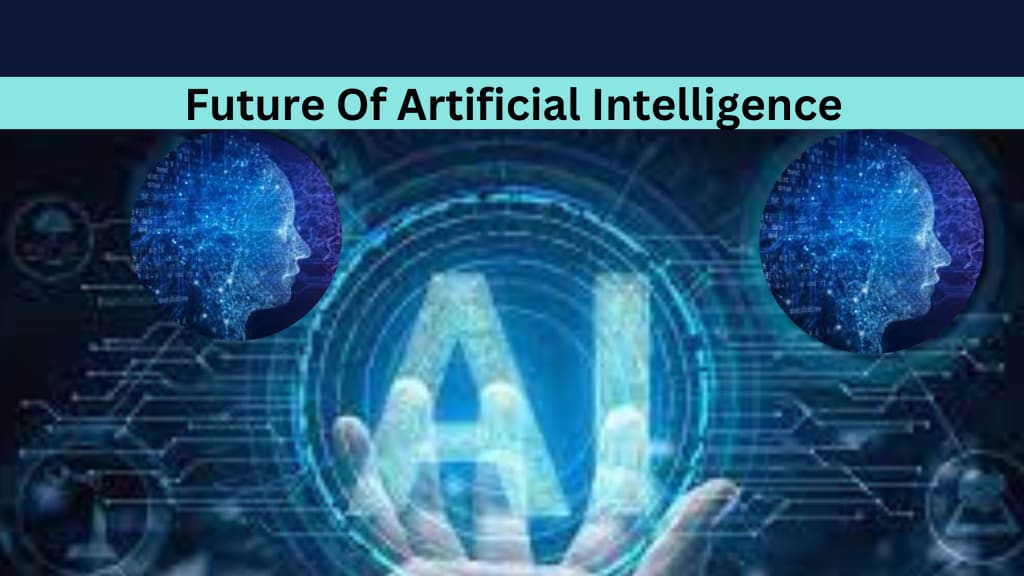Future Of Artificial Intelligence In Every Life
Future Of Artificial Intelligence (AI)

I. Introduction:
A. Definition of artificial intelligence (AI):
Artificial intelligence refers to the development of computer systems that can perform tasks that typically require human intelligence, such as visual perception, speech recognition, decision-making, and problem-solving. It involves the use of algorithms and machine learning techniques to enable machines to learn from data, adapt, and make intelligent decisions.
artificial intelligence (AI) role in different profession of life:
AI in Healthcare:
A. Role of AI in disease treatment:
AI algorithms can analyze vast amounts of medical data, including patient records, symptoms, and medical imaging, to assist healthcare professionals in accurately diagnosing diseases. AI-based diagnostic tools can provide more efficient and accurate assessments, leading to early detection and timely treatment. We will highlight the potential of AI in improving healthcare outcomes and reducing diagnostic errors.
B. AI-powered medical imaging and diagnostics:
AI algorithms can analyze medical images, such as X-rays, MRIs, and CT scans, with high precision and speed. This enables healthcare providers to detect abnormalities, tumors, and other medical conditions more accurately and efficiently. We will discuss the impact of AI-powered diagnostics on improving patient care and enhancing the efficiency of healthcare workflows.
C. AI-assisted robotic surgeries:
AI technologies enable robots to assist surgeons in performing complex procedures with greater precision and control. By combining AI algorithms with robotic systems, surgeons can achieve enhanced surgical outcomes, reduced invasiveness, and shorter recovery times. We will highlight the potential of AI-assisted robotic surgeries in transforming surgical practices and improving patient safety.
D. Personalized medicine and drug discovery advancements:
AI algorithms can analyze genetic data, patient characteristics, and medical records to tailor treatment plans and medications to individual patients. This approach allows for more targeted and effective therapies, minimizing adverse effects and optimizing patient outcomes. We will discuss the potential of AI in accelerating drug discovery processes by analyzing vast datasets, predicting drug interactions, and identifying potential drug candidates.
By examining the applications of AI in healthcare, we highlight the transformative potential of artificial intelligence in revolutionizing disease diagnosis, treatment, medical imaging, surgical procedures, and personalized medicine. AI-driven advancements in healthcare have the potential to improve patient outcomes, enhance efficiency, and lead to significant advancements in medical research and practice.
AI in Education:
A. AI-based personalized learning platforms:
AI technology can personalize the learning experience by adapting to individual students' needs, preferences, and learning styles. It offers customized content, adaptive learning paths, and intelligent feedback to enhance student engagement and improve learning outcomes.
B. Intelligent tutoring systems and virtual assistants:
AI-powered tutoring systems and virtual assistants provide personalized guidance, answering students' questions, and offering interactive learning experiences. They can analyze student performance data to identify areas of improvement and provide targeted support.
C. Adaptive assessments and feedback mechanisms:
AI can revolutionize assessments by providing adaptive and personalized tests that adjust difficulty levels based on individual performance. It also offers intelligent feedback and recommendations for improvement, enhancing the effectiveness of assessments.
D. Enhanced administrative tasks and educational analytics:
AI streamlines administrative tasks in educational institutions, automating processes like admissions, scheduling, and record-keeping. It also enables data-driven decision-making through educational analytics, extracting valuable insights from large datasets to improve institutional efficiency and student success.
AI in Transportation:
A. Self-driving cars and autonomous vehicles:
AI plays a crucial role in developing self-driving cars and autonomous vehicles, enabling them to navigate roads, make decisions, and enhance road safety. These advancements have the potential to revolutionize transportation and improve efficiency.
B. Traffic management and optimization:
AI can analyze traffic patterns, optimize traffic flow, and reduce congestion by dynamically adjusting traffic signals and routes. It helps improve transportation efficiency, reduce travel time, and minimize environmental impact.
C. Predictive maintenance and safety enhancements:
AI can predict maintenance needs in vehicles, allowing for proactive maintenance and reducing breakdowns. It also assists in real-time monitoring of vehicle conditions, ensuring safety and preventing accidents.
D. Smart transportation systems and infrastructure:
AI enables the development of smart transportation systems, including intelligent transportation networks, connected vehicles, and infrastructure. These systems enhance communication, efficiency, and safety in transportation.
AI in Finance:
A. Algorithmic trading and investment analysis:
AI algorithms analyze financial data, patterns, and market trends to make informed investment decisions. It also facilitates algorithmic trading, enabling faster and more accurate trading strategies.
B. Fraud detection and risk management:
AI algorithms can detect patterns of fraudulent activities, enhancing fraud detection and prevention in financial transactions. It also assists in risk management by analyzing complex data and identifying potential risks.
C. Customer service and chatbot assistance:
AI-powered chatbots provide instant customer support, answering inquiries, and resolving common issues. They improve customer service efficiency, responsiveness, and accessibility.
D. Personalized financial planning and recommendations:
AI can analyze individual financial data, goals, and risk profiles to provide personalized financial advice and recommendations. It helps individuals make informed decisions and manage their finances effectively.
AI in Manufacturing and Industry:
A. Automation and robotic systems:
AI enables the automation of various manufacturing processes, leading to increased productivity, reduced costs, and improved efficiency. Robotic systems powered by AI can perform complex tasks with precision and consistency.
B. Predictive maintenance and quality control:
AI algorithms can predict equipment failures and maintenance needs, minimizing downtime and optimizing maintenance schedules. AI also enhances quality control by identifying defects, anomalies, and potential issues in real-time.
C. Supply chain optimization and logistics:
AI helps optimize supply chain management by analyzing data, forecasting demand, and improving inventory management. It enhances logistics operations, including route optimization, delivery tracking, and warehouse management.
D. Enhanced productivity and efficiency:
AI applications such as process automation, data analytics, and machine learning algorithms improve overall productivity and efficiency in manufacturing and industry. It streamlines operations, reduces errors, and enhances decision-making.
5. AI in Entertainment and Media:
A. Content recommendation and personalization:
AI algorithms analyze user preferences, behavior, and content consumption patterns to provide personalized recommendations in entertainment and media platforms. It enhances user experience and engagement.
B. Virtual reality (VR) and augmented reality (AR) experiences:
AI enables immersive and interactive VR and AR experiences in gaming, entertainment, and media. It enhances storytelling, visualization, and user interaction.
C. AI-generated music, art, and storytelling:
AI algorithms can generate music, art, and storytelling content, offering unique and creative outputs. It opens new possibilities for artistic expression and content creation.
D. Advanced data analytics and audience insights:
AI-based analytics tools analyze audience data, social media trends, and content performance metrics to provide valuable insights for content creators, marketers, and media professionals. It aids in content strategy, audience targeting, and decision-making processes.
Future Trends and Possibilities:
A. Advancements in machine learning and deep learning:
The continuous advancements in machine learning and deep learning techniques will lead to more sophisticated AI models and algorithms. This will enable AI systems to learn and adapt in increasingly complex environments and perform tasks with higher accuracy and efficiency.
B. Integration of AI with Internet of Things (IoT):
The integration of AI with IoT devices will create a network of interconnected smart devices that can collect and exchange data. AI algorithms can analyze this data in real-time, enabling intelligent decision-making and automation in various domains such as smart homes, cities, and industries.
C. Ethical guidelines and regulations in AI development:
As AI becomes more pervasive, the development and implementation of ethical guidelines and regulations will be crucial. These guidelines will address concerns such as privacy, bias, transparency, and accountability, ensuring that AI technologies are developed and used responsibly.
D. Collaborative AI systems and human-AI partnerships:
The future will see increased collaboration between humans and AI systems. AI will assist humans in performing tasks, augmenting their capabilities and productivity. Human-AI partnerships will enable the combination of human creativity, intuition, and ethical judgment with the computational power and efficiency of AI.
Recap the transformative impact of AI in everyday life:
AI has revolutionized industries and improved efficiency, productivity, and user experience. It is crucial to recognize the importance of responsible and ethical AI development. As AI continues to evolve, it is essential to prioritize fairness, transparency, privacy, and accountability in AI systems to ensure their beneficial and responsible use.
As we move forward, embracing the potential of AI and exploring its possibilities will lead us to a brighter future. Continued research, innovation, and collaboration in AI development will unlock new opportunities and solutions to address complex societal challenges.
About the Creator
khadija yousaf
i am creative blog writer from pakistan and have much experience in this field
Enjoyed the story? Support the Creator.
Subscribe for free to receive all their stories in your feed. You could also pledge your support or give them a one-off tip, letting them know you appreciate their work.






Comments
There are no comments for this story
Be the first to respond and start the conversation.